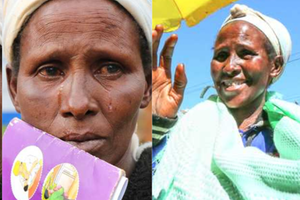
Jaramogi Oginga Odinga Teaching and Referral Hospital (JOOTRH).
Mary Kwangwa paces restlessly at Jaramogi Oginga Odinga Teaching and Referral Hospital (JOOTRH) in Kisumu County.
Clutching a handful of papers, she anxiously awaits a text message from Mbale, Vihiga County, that will allow her to clear her sister’s hospital bill of Sh64,307.
Mary’s sister, Racheal Elegosa, was rushed to JOOTRH on November 10 after slipping and sustaining a severe head injury at her home in Mbale, which resulted in a blood clot in her brain.
While the surgery was successful, Racheal is now detained at the hospital – five days after her scheduled discharge – due to delays in the Social Health Insurance Fund (SHIF) system.
“When we took the patient to Vihiga County Referral Hospital we made payments through SHA (Social Health Authority) and we were referred to JOOTRH. But now the hospital is demanding proof of that payment, or we pay the balance in cash while we are not in a position to raise the funds,” she told Nation.
Mary’s frustration is echoed by Jane Otieno, who brought a cancer patient to the regional referral hospital for treatment on November 14.
Also covered under SHIF, the patient was turned away because the hospital system had not reflected their insurance status.
“They first told us that the medicines were not available and asked us to come back today. Now they are saying SHIF has not updated our details. What are we supposed to do now?” She lamented.
The two cases highlight a broader crisis affecting many residents who depend on the new medical insurance system.
Kisumu City Manager Abala Wanga recently criticised the national government for its slow response in resolving issues with SHIF, which replaced the National Health Insurance Fund (NHIF).
“The transition has been a disaster,” Mr Wanga said during the launch of Avenue Hospital’s Accident and Emergency Unit last week.
“How do you expect to run hospitals if SHA payments delay for months? How do they treat patients who cannot pay out of pocket? The government needs to act quickly and save lives.”
Health Cabinet Secretary Deborah Barasa has however defended the rollout of SHIF, claiming progress is being made.
“JOOTRH has received payments for pending NHIF bills and by the end of November, they’ll get their first SHA payments,” Dr Barasa said while inspecting JOOTRH on Monday.
She noted that eight out of 10 patients at the hospital’s Renal Unit were already benefiting from SHA coverage.
Speaking a day earlier in Trans Nzoia and West Pokot counties, Dr Barasa denied claims that the Linda Mama programme has been scrapped, reassuring the public that mothers who cannot afford to pay for maternal services will continue to access free care under the Social Health Authority (SHA).
“The Linda Mama programme has not been scrapped. Any mother who cannot afford to pay for their maternal health services will still receive free services under SHA,” she clarified. At Level 2, 3, and 4 hospitals, all registered mothers will be able to access antenatal and postnatal care services without being turned away or asked to pay out of pocket,” she said.
The CS pleaded for patience among Kenyans on the implementation of the newly-rolled out Social Health Insurance Fund (SHIF) service. Dr Barasa admitted hitches in the implementation of the new medical insurance fund but noted that the Ministry of Health is working to ensure Kenyans get better services.
“Let’s give the SHA time to stabilise. This is a work in progress. We still have some teething problems but are working to make it succeed,” Dr Deborah appealed.
Like a baby
The CS said that just like a baby, the authority was undergoing a development process and time will make it effective and its mandate more objective.
“We have noted the challenges we have experienced and are working every day to improve our services. As government we must improve these services to Kenyans every day,” the CS said at Christ the King Catholic Church in Mitume, Trans Nzoia County, amid growing criticism of the new health insurance scheme.











